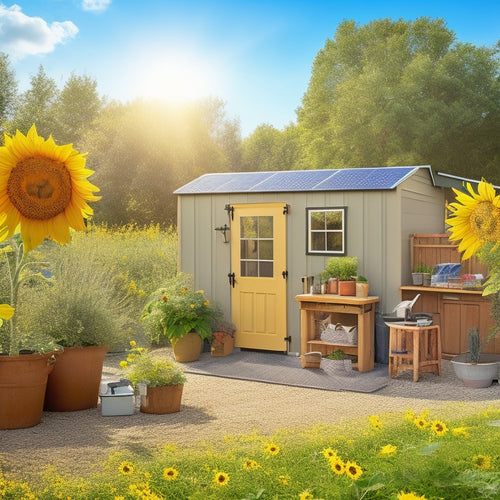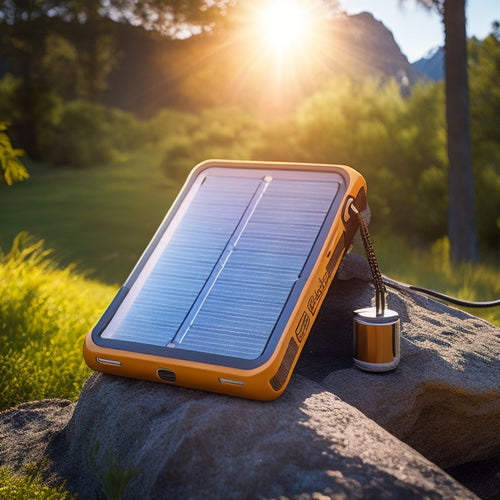
Small Solar Battery
Share
You're looking for a reliable and efficient power solution that allows you to utilize the sun's energy on-the-go, which is where small solar batteries come in, providing a portable, eco-friendly, and sustainable alternative to traditional power sources. They offer a reduced carbon footprint, lower emissions, and a quieter experience compared to fuel-powered generators. With deep cycle lithium technology, you'll get higher energy density, longer lifetimes, and lower maintenance requirements. To guarantee you get the right fit, you'll need to calculate your total power requirements and appliance wattage needs. Now, investigate how small solar batteries can power your off-grid escapades.
The Essentials
- Small solar batteries provide portable power solutions for camping, RVing, and fieldwork, eliminating noisy fuel-powered generators and enhancing outdoor experiences.
- These eco-friendly energy sources reduce reliance on fossil fuels, leading to lower carbon emissions and environmental impact, supporting sustainable living initiatives.
- Key considerations for small solar batteries include capacity, weight, and durability, ensuring reliable energy for devices and lighting in off-grid settings.
- Deep cycle lithium batteries offer higher energy density, longer lifetimes, and lower maintenance requirements, making them ideal for small solar battery systems.
- Accurate evaluation of wattage needs is crucial to size the solar battery correctly, ensuring compatibility with energy management strategies and battery efficiency.
Portability Boosts Off-Grid Freedom
You're no longer tied to the grid with a small solar battery that's designed to be portable.
This means you can take power on the go, whether you're camping, RVing, or working in the field.
By eliminating the need for cumbersome and noisy fuel-powered generators, you can enjoy a more peaceful and environmentally friendly experience.
With freedom in a box, you can generate electricity anywhere the sun shines, giving you the independence to live and work off the grid.
Power On The Go
As you traverse further off the grid, the need for reliable, portable power sources becomes increasingly critical. You require a constant flow of energy to keep your devices charged and your lights on, no matter where your expedition takes you.
That's where mobile energy comes in – a transformative solution for off-grid enthusiasts. With a small solar battery, you can capture the sun's energy and convert it into usable power on the go. In addition, a portable power bank with a built-in solar panel Renewable Energy can provide a convenient and sustainable way to keep your devices powered up.
Solar charging is a convenient and sustainable way to keep your devices powered up. You can charge your battery during the day, and then use it to power your gear at night. This flexibility is essential for those who crave freedom from the grid.
A portable power source gives you the confidence to investigate remote areas, knowing you'll always have access to the energy you need. When choosing a solar battery, consider factors like capacity, weight, and durability. Look for a battery that's designed for mobile energy, with a compact design and rugged construction.
With the right gear, you'll be able to power your experiences and stay connected, no matter where you roam.
Freedom In A Box
Every off-grid enthusiast knows that true freedom lies in the ability to roam untethered, unfettered by the constraints of traditional power sources. You crave energy independence and sustainable living, and that's where our small solar battery comes in.
This compact design is specifically engineered for outdoor excursions, providing you with a reliable source of renewable energy wherever you go. With the ability to keep your devices charged in remote areas with limited access to power outlets, you can enjoy the great outdoors without worrying about running out of power portable power bank.
Our small solar battery also reduces reliance on disposable batteries that can harm the environment, making it an eco-friendly choice for outdoor enthusiasts. With its versatile applications, you can power everything from camping gear to outdoor equipment, and even your home.
The smart charging technology guarantees you're getting the most out of your battery, while our off-grid innovations pave the way for future technology. As an eco-conscious individual, you'll appreciate the environmentally friendly aspect of our solar battery.
It's a revolutionary tool for those who desire freedom from the grid, without sacrificing convenience or performance. By choosing our small solar battery, you're making an eco-friendly choice that aligns with your values and supports your love for the great outdoors.
Reduced Carbon Footprint Guaranteed
You're switching to a cleaner, eco-friendly energy source with small solar batteries, which considerably reduces your reliance on fossil fuels.
By leveraging residential solar energy systems, you'll be able to generate renewable energy and reduce your energy bills.
As a result, you'll produce lower emissions today, contributing less to greenhouse gases and air pollution.
Eco-Friendly Energy Source
Frequently, homeowners and businesses seek alternative energy sources to reduce their environmental impact. You're likely looking for a reliable and eco-friendly solution to power your home or office. A small solar battery is an excellent option, offering a reduced carbon footprint guaranteed. By utilizing the power of the sun, you can reduce your reliance on fossil fuels and lower your carbon emissions.
Here's a comparison of traditional energy sources with solar energy:
| Energy Source | Environmental Impact |
| Fossil Fuels | High carbon emissions, air and water pollution |
| Nuclear Energy | High carbon emissions, radioactive waste |
| Solar Energy | Zero emissions, renewable and sustainable |
| Wind Energy | Low emissions, intermittent power supply |
Lower Emissions Today
One notable advantage of incorporating a small solar battery into your energy system is that it enables you to make a tangible impact on reducing your carbon footprint immediately. By utilizing renewable energy from the sun, you'll greatly decrease your reliance on fossil fuels, resulting in a substantial emission reduction.
This shift towards sustainable living not only benefits the environment but also contributes to a cleaner, healthier community.
When you opt for a small solar battery, you'll experience a noticeable decrease in your carbon emissions. This is because solar energy is a zero-emission source, producing no pollutants or greenhouse gases during operation.
As you generate your own clean energy, you'll reduce your dependence on the grid, which is often powered by fossil fuels. By doing so, you'll be taking an essential step towards mitigating climate change and promoting a sustainable future.
With a small solar battery, you'll be making a conscious choice to live more sustainably, and that's a freedom worth fighting for.
Deep Cycle Lithium Tech
You're likely considering a small solar battery that utilizes deep cycle lithium technology, which offers several advantages over traditional lead-acid batteries.
Lithium-ion batteries boast higher energy density, longer lifetimes, and reduced maintenance needs, making them an attractive option for residential solar power and off-grid power backup systems.
Additionally, deep cycle lithium batteries are well-suited for renewable energy systems that require a reliable source of power.
When selecting a deep cycle lithium battery, you'll want to carefully evaluate the cycle life expectancy to ascertain it meets your specific application requirements.
Lithium Ion Advantages
Lithium-ion batteries, particularly those employing deep cycle lithium technology, boast a multitude of advantages that make them an attractive option for small solar battery applications. You'll appreciate the benefits they bring to your off-grid setup.
One significant advantage is their high energy density. This means you can store more energy in a smaller space, making them ideal for small solar battery systems. Additionally, lithium-ion batteries offer excellent cost efficiency. They have a longer lifespan and require less maintenance compared to traditional lead-acid batteries, resulting in significant cost savings over time.
Here's a summary of the key advantages of lithium-ion batteries:
| Advantage | Description | Benefit |
| High Energy Density | More energy in a smaller space | Compact design, ideal for small solar battery systems |
| Cost Efficiency | Longer lifespan, less maintenance | Significant cost savings over time |
| Low Self-Discharge | Retains charge when not in use | Longer shelf life, reduced maintenance |
| Wide Operating Temperature | Performs well in various temperatures | Reliable performance in diverse environments |
These advantages make lithium-ion batteries an excellent choice for small solar battery applications, providing you with a reliable and efficient energy storage solution.
Cycle Life Expectancy
Your deep cycle lithium battery's lifespan is a critical factor in determining its overall performance and value. When it comes to cycle life expectancy, deep cycle lithium batteries outshine their lead-acid counterparts. You can expect a deep cycle lithium battery to last for 3,000 to 5,000 charge/discharge cycles, compared to a lead-acid battery's 200 to 500 cycles. This means you'll get more bang for your buck with a lithium battery, as it'll provide reliable power for a longer period.
In terms of battery longevity, deep cycle lithium batteries are the clear winner. With proper maintenance, a lithium battery can last up to 10 years or more, while a lead-acid battery typically lasts around 3 to 5 years.
When making a lifespan comparison, it's clear that lithium batteries offer superior performance and longevity. This extended lifespan means you'll have fewer replacements to worry about, giving you more freedom to focus on your off-grid excursions or daily life.
Check Your Wattage Needs
You need to calculate the total power required to run your appliances off-grid, which involves determining the wattage needs of each device.
This means identifying the specific power requirements of your lights, laptop, fridge, and other equipment to guarantee your small solar battery can handle the load.
For instance, you may want to contemplate home battery systems that can provide backup energy during power outages.
Accurately evaluating your appliance wattage needs will help you size your solar battery and system correctly.
Total Power Required
Determining the total power required is an essential step in selecting a suitable small solar battery, as it directly impacts the battery's size, cost, and overall performance.
To calculate your total power needs, you'll need to take into account your energy management strategy and the efficiency of your battery. A high-efficiency battery will require less power to achieve the same results, reducing the overall size and cost of your system.
You'll need to account for the power requirements of all your appliances, as well as any energy losses due to charging and discharging.
Take into account the maximum power draw of each appliance, as well as the average power consumption over time. Additionally, factor in any auxiliary systems, such as inverters or charge controllers, which also consume power.
Appliance Wattage Needs
Appliance Wattage Needs
Most appliances have a wattage rating listed on their nameplate or in their documentation. You'll need to gather this information for each appliance you plan to power with your small solar battery. This rating indicates the maximum amount of power the appliance can draw from the battery.
To calculate your total energy consumption, you'll need to determine the wattage requirement for each appliance. Make a list of the appliances you want to power, and note their corresponding wattage ratings. For example, a laptop might require 65 watts, while a refrigerator might need 150 watts.
Next, calculate the total wattage required by adding up the individual wattage ratings. This will give you your total energy consumption. Be sure to take into account the wattage calculation for each appliance during both startup and operation, as some devices require more power during startup.
Accurate wattage calculation is essential to guarantee your small solar battery can meet your energy needs. By knowing the exact wattage requirements of your appliances, you can design a solar battery system that provides the necessary power and energy independence you desire.
Longer Shelf Life Guaranteed
You expect your small solar battery to remain functional when you need it, and a longer shelf life guarantees that.
This is where extended storage capacity comes in, allowing you to store more energy for later use.
With a higher storage capacity, you can rely on your solar battery to provide power when you need it, even after extended periods of non-use.
Extended Storage Capacity
The small solar battery's extended storage capacity guarantees a longer shelf life, assuring that your energy needs are met even when the sun isn't shining. This means you'll have a reliable source of power, whenever you need it.
With an extended storage capacity, you can store more energy during the day, and use it at night or during periods of low sunlight. This is particularly useful for off-grid systems, where energy independence is essential.
The battery's efficiency is optimized through advanced energy management systems, which confirm that the stored energy is used efficiently. This results in a longer lifespan for the battery, reducing the need for frequent replacements.
You'll enjoy a greater sense of freedom, knowing that your energy needs are met, without relying on the grid. The extended storage capacity of the small solar battery is designed to provide you with peace of mind, and the freedom to live life on your own terms.
Frequently Asked Questions
Can I Use a Small Solar Battery for My RV or Camper?
You can definitely consider a solar battery for your RV or camper, leveraging solar battery advantages to enhance RV energy efficiency, allowing you to venture further off-grid while reducing your reliance on traditional power sources.
How Do I Properly Maintain My Small Solar Battery?
To maximize your battery lifespan, you'll want to follow essential maintenance tips: monitor charge cycles, keep it clean, and store it properly; by doing so, you'll guarantee your off-grid excursions remain uninterrupted and your freedom untethered.
Are Small Solar Batteries Compatible With AC Appliances?
You're likely aware that 70% of off-grid solar systems use DC-coupled inverters; now, regarding AC appliance compatibility, you'll need to choose the right solar battery type and inverter selection to guarantee seamless power conversion for your desired devices.
Can I Charge My Small Solar Battery Using a Wall Outlet?
You can charge your battery using a wall outlet, but you'll need a compatible charger that supports solar battery charging via AC power; investigate wall outlet options that match your battery's voltage and capacity requirements.
Are Small Solar Batteries Affected by Extreme Temperatures?
You'll find that extreme temperatures greatly impact battery lifespan; high temps accelerate degradation, while low temps reduce capacity. When using a small solar battery, you'll want to take into account temperature fluctuations to maximize its lifespan and overall performance.
Final Thoughts
As you unplug from the grid, a small solar battery becomes your trusted compass, guiding you through the wilderness of off-grid freedom. With carbon emissions dwindling like a fading sunset, you'll find solace in the deep cycle lithium technology that powers your exploits. Like a lighthouse in the dark, your wattage needs are met, and your shelf life is extended, ensuring your expedition is long and unencumbered.
Related Posts
-

How to Achieve a Zero-Waste Lifestyle for a Greener Tomorrow
To achieve a zero-waste lifestyle, start by adopting the principles of refusing, reducing, reusing, and recycling. Sw...
-

Building an Emergency Backup Solar Power System in 5 Essential Steps
Building an emergency backup solar power system involves five key steps. First, assess your daily energy needs to ide...
-

Fastest Solar Chargers for Emergency Power
When choosing the fastest solar chargers for emergency power, you need to focus on features like rapid charging capab...


